Talking on air about the benefits of technology for people living dementia, it was great to hear our CEO Isobel Jones on BBC Radio Bristol last week. Have a listen below…
Listen to the full feature on BBC Sounds here.

Talking on air about the benefits of technology for people living dementia, it was great to hear our CEO Isobel Jones on BBC Radio Bristol last week. Have a listen below…
Listen to the full feature on BBC Sounds here.

Tabletop Travels is a brilliant initiative to have come out of the work Alive have done with the University of Bristol as part of the Connecting Through Culture project: a multi-sensory travel experience in the form of a gift box, co-designed with and for older people who are isolated at home.
Leading on on business strategy and developing relationships with corporate sponsors and community partners, this role will be instrumental in getting Tabletop Travels to those for whom it will make a real difference.
Find out more here.

Watch us on The One Show: the BBC crew joined us for a Hoppiness session at Beaufort Grange Care home, interviewing Guy about the project and chatting to participants.
The feature was fronted by Ted Lasso actor and Celebrity Bear Hunt competitor Kola Bokinni, whose personal experience with dementia has made him a passionate advocate for greater support and understanding for those affected by the disease. It was fantastic chatting with Kola about the project’s aims—especially the importance of meaningful, engaging activities for those living with dementia and how Alive’s work supports everyone affected by dementia, not just those with the diagnosis.
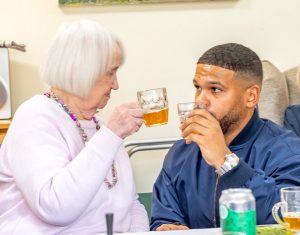
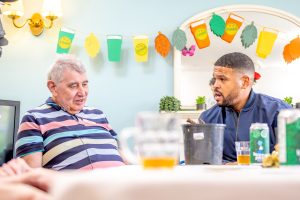
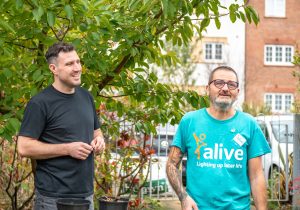

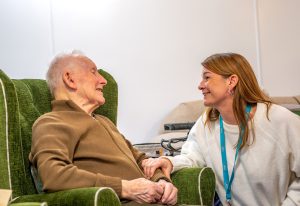

Another key goal of The Hoppiness Project was to challenge perceptions around dementia and care homes so we are incredibly proud that this feature is part of the BBC’s special new season across TV, iPlayer and Radio called Memories and Dementia: Starting the Conversation.
A huge thank you to all our amazing partners who made this happen:
– Karen & Martin from the University of Bristol’s Brigstow Institute
– Rich from Left Handed Giant Brewing Co.
– Lucy from Beaufort Grange Care Home
– The team at Bristol Hops Collective
Find out more about The Hoppiness Project here.

Following a change in staffing at Age UK Bristol, we are thrilled to announce we have reached agreement to transfer their Memory Connections service to Alive. This transition ensures the continuation of top-quality services aimed at supporting people with low to moderate dementia to maintain their cognitive ability through stimulating activities and social engagement. Age UK Bristol have been running two groups in Bristol for the last four years, providing vital support to those who are living with dementia, and we are delighted we can continue these groups.
Continuity of Excellence in Dementia Support
Memory Connections uses Maintenance Cognitive Stimulation Therapy which is designed to maintain memory skills, build confidence, and offer opportunities for socialisation in a supportive environment. These weekly two-hour sessions incorporate a variety of activities, including arts and crafts, reminiscence therapy, quizzes, music, and movement, all aimed at promoting mental functioning and overall wellbeing.
These groups naturally fit with the expertise and activity Alive runs, and we are delighted we can continue a much-needed service. We are renowned for our innovative approaches, intergenerational work, social and therapeutic horticulture sessions, and community-based initiatives that connect people in care homes to broader communities. These groups take our service to the next level and we hope to expand these groups to a wider area.
A Continued Quality Service for Dementia Care
This partnership reflects a unified vision to create a dementia-friendly community in Bristol, where people with dementia are supported to live well and remain connected to their communities. The transition promises to enrich the lives of participants and provide continued respite and support for carers. Age UK Bristol and Alive Activities are working together to ensure that the transition is seamless and works well for all of the current members.
Looking Ahead
Age UK Bristol’s final Memory Connections session will be held on Wednesday 12th March 2025 and the service will then transfer to Alive Activities who will be running Memory Connections sessions from 19th March.
Alive will run Wednesday groups at Westbury Fields in Westbury-on-Trym, and Thursday groups in Henleaze.
For more details on timings and venues, please contact Carmel on 07861 385 543, email info@aliveactivities.org, or find out more here.
It was brilliant to see the BBC coverage of our Lullaby Circle yesterday on BBC Breakfast, Points West and Radio Bristol with Joe Sims.
Filmed at Deerhurst Care Home, it was a great chance to share how truly magical these sessions are at connecting parents and babies with care home residents for moments of joy and togetherness. Just look at those smiles!
The Lullaby Circle is part of our STANd project, funded by The National Lottery. The programme will see the development of a series of pilot projects in care homes and communities linking older and younger people, new training models in intergenerational delivery and project planning, and the founding of Bristol and North Somerset Intergenerational Linking Networks.
Find out more here.

Are you someone who is experiencing memory difficulties? Awaiting or adjusting to a dementia diagnosis? Or supporting a loved one who is?
If so, you are very welcome to join us in our free informal monthly peer support group where you are invited to:
Share your experiences in a safe, friendly and non-judgemental space
Socialise and connect with others who are in a similar situation
Explore positive ways to navigate and adjust to changes in your roles and relationships
Learn skills and techniques to support mental health and promote emotional well-being
Recreate meaning and purpose within your life
This group is open to South Gloucestershire residents who are aged 55+ experiencing memory difficulties or living with a recent dementia diagnosis, plus their care partners.
If you are interested in attending this group or would like further information, please email: julie@aliveactivities.org

The FREE annual event, Let’s Talk Dementia, is back in Bristol on Saturday 17th May!
Join us on the day where you will find dementia specialists giving short talks, meet knowledgeable exhibitors, and join engaging activity sessions for people living with dementia.
Let’s Talk Dementia is a free, public information event that offers attendees the chance to access dementia information in a friendly and informal setting.



A one stop event for all things dementia, bringing together experts from across the South West in care, health, research, legal matters and much more.
This event is in partnership with fellow Bristol charities BRACE Alzheimer’s Research and Bristol Dementia Action Alliance.
Find out more via BRACE here.
Join us at the Bristol Royal Infirmary for monthly intergenerational tea parties and creative story-telling, all while admiring the history of Bristol.
A chance to connect with others over tea & cake, as well as explore local history and stories. This opportunity is for young people aged 5 and under with their grown ups alongside patients at the BRI.
Starting March 2025. The first 3 sessions are as follows:
March 10th 1pm-3pm
April 7th 1pm-3pm
May 12th 1pm-3pm
If you would like to book your FREE place for you and your toddler, please email: mel@aliveactivities.org
We can cover the costs of travel if local, or parking fare.
Learn more about our STANd project here.
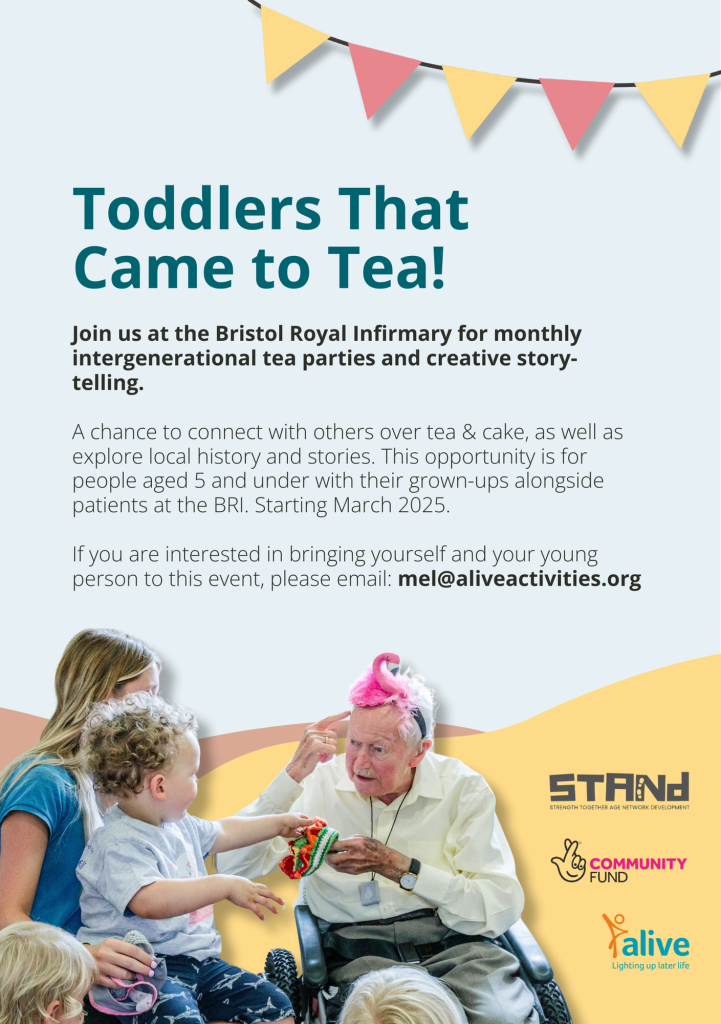
As National Activity Providers & Professionals Week celebrates the incredible work, compassion and commitment of activity providers, we asked some of our team what the role means to them.
Sam, Eeva and Jacqui are three of our amazing facilitators and their activity sessions in care homes and across the community bring smiles, comfort and joy to so many older people. Here’s what they said…

Having retrained as a community dance practitioner last year, I feel very lucky to share my joy of dancing and music with people. Seeing people smile the moment they hear a favourite tune is the best feeling you can get.
Having cared for my Mum who had dementia, I know just how much music and dancing can help people relax by bringing them back into happy memories. Now I get to hear lots of amazing stories: from the excitement of seeing The Beatles live, to hearing how people met their partners at the local dance. I’m so lucky to be able to do this as my job.
When people find it difficult to express themselves, dancing provides a different way to communicate. I love to see how playing music helps people to connect with others.
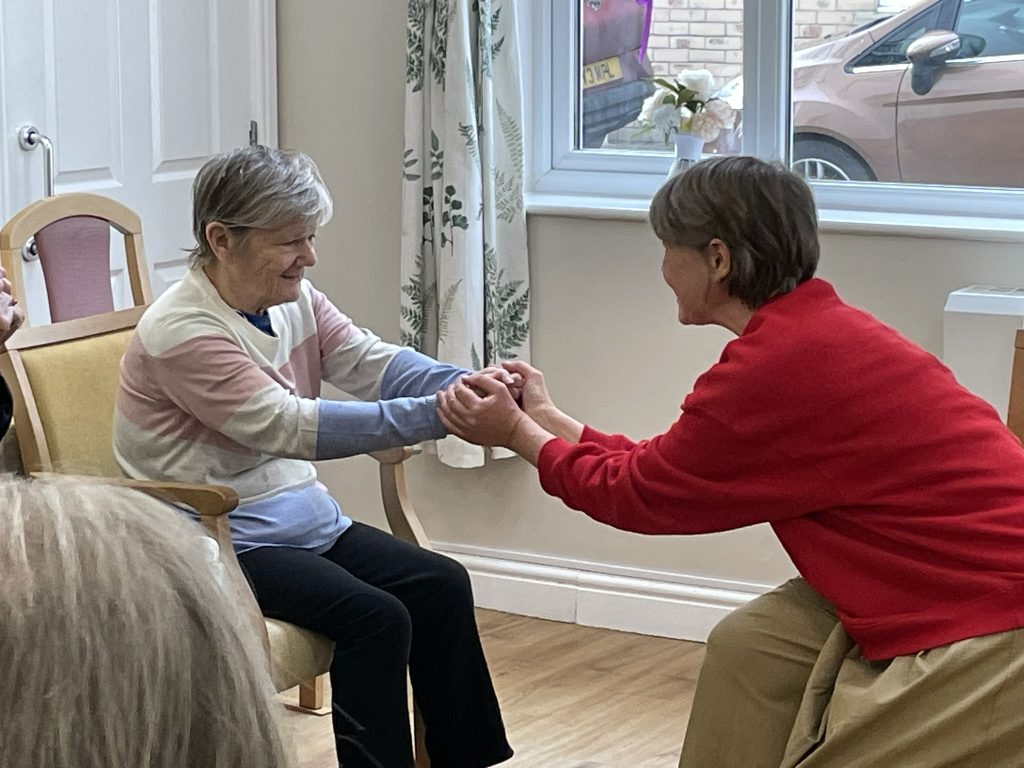
My work with 0-104 year olds has always got the first focus on wellbeing and learning ‘sustainability’ in relation to ourselves/our bodies.
I like teaching movement to ‘ordinary people’ who might very well say at first, ‘oh, I’m not a dancer!’. It is very rewarding to discover, together, where everyday movement becomes something else, something with meaning, with feeling and the effect is felt in a smile or an uplift in mood.
Through the work with Alive, I have been lucky to make many a heartful connection with people in their care settings and hopefully my sessions have contributed to the elders’ overall sense of wellbeing and belonging!
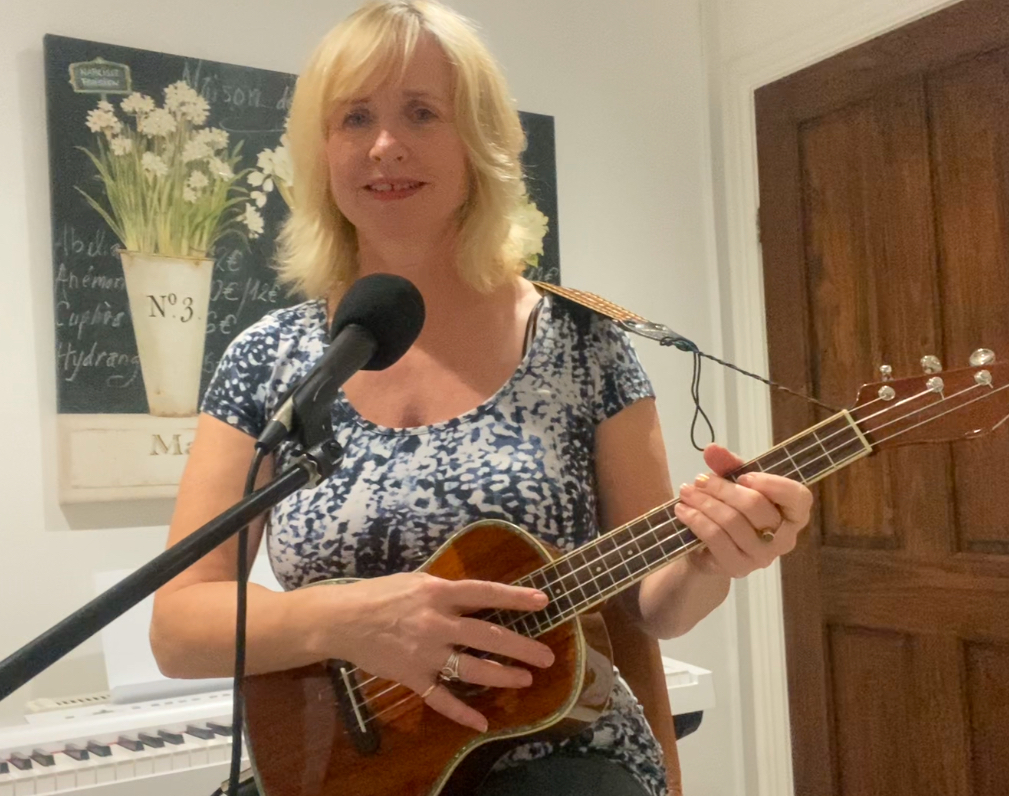
Knowing that I will have brought some extra cheer, smiles and kindness through touch, conversation and beautiful music is a wonderful feeling.
Making those special connections with individuals and groups, that really need uplifting and human warmth, fills my heart with joy.
Want to know more?
Dive in to our wide range of activity sessions, or get in touch with us to book here.
We’re thrilled to announce that we will be returning to Birmingham in March for the Markel 3rd Sector Care Awards.
Following on from a triumphant 2022 which saw us winning the Dementia Care Award for our dementia-friendly allotment in Brentry and Technology Award for our Alive on Demand service, 2025 sees two of our gardening projects shortlisted:
Abi’s work at Sanctuary Square Garden with the Bristol Royal Infirmary is up for the Collaboration (Integration) Award.
Guy’s project with the University of Bristol’s Brigstow Institute, Hoppiness: Brewing with Care Homes, is up for the Development and Innovation Award.

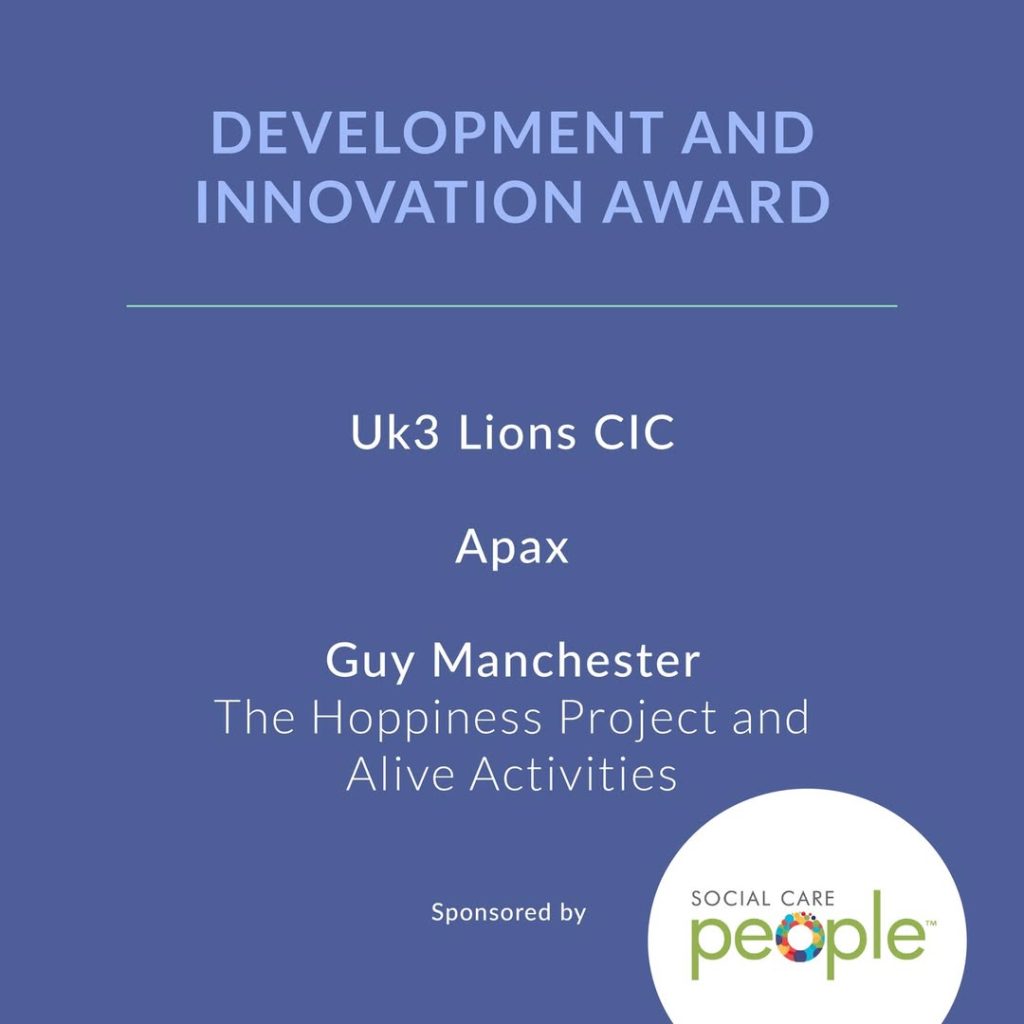
Excited for another opportunity to see both Guy and Abi out of their gardening clothes, we are especially proud of our team and wish them and all the other nominees the very best of luck.
Read about our 2022 awards here.
Learn more about the Markel 3rd Sector Care Awards here.